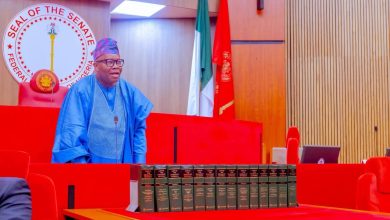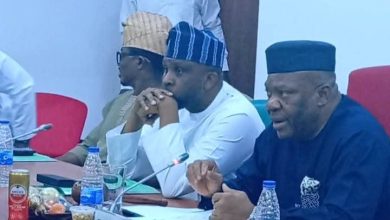
In Akwa Ibom State presently, there is an ongoing zoning discourse that is catching attention. The learned and the none are all talking about the sharing of political power in the state. The rich and the poor are all interested in the conversation. It is actually not a time when people will be asked to go to their tents. It is rather a time when every person has to answer to their fathers’ names.
In all the conversations, there are two broad categories of people. While the first set are expressive, making their positions known without an iota of reservation, others are seemingly silent based on their perceived difference. Some are even silent because of their cleavages. They are not willing to make their positions known, perhaps because it will tantamount to a gross disrespect and disloyalty to their ‘superiors’. This artistic work has no time digging into the minds of those who are silent on the matter. It is only concerned with the views of those who are bold enough to make their opinions known. Of course, this is done with the consciousness that all silent onlookers would have to be affected or perhaps ‘infected’ with the consequences of their silence.
Squarely, the ongoing debate is a product of one man’s deliberative foresight. Hon. Eseme Eyiboh is the first to have opened the floor for this current stream of thoughtful provocations. He granted an interview with The Sun Newspapers, where he posited that the zoning clock of the state has been concluded. Pointedly, Eseme Eyiboh, himself a former director, Akwa Palms Ltd and former chairman, Ethical and Attitudinal Re-orientation Commission of the state, opined that zoning has achieved its purpose in Akwa Ibom.
The former member, Eket Federal Constituency, who is currently the chairman, Cross River Basin Development Authority, maintained that none of the three senatorial districts should be subjected to a long wait, but that everyone from all the districts should contest for a fresh start. Hear him: “Any senatorial district that the governor emerges from a free and unrestricted process in 2023 shall begin the second cycle of the Akwa Ibom State governorship. We must all return to the Akwa Ibom solidarity and common brotherhood regardless of the uncircumcised umbrage of the destitute of democratic culture.
Sovereignty belongs to the people and not the birthright of any community or individual. Akwa Ibom State governorship trophy 2023 shall be delivered by the people and inaugurated by the will of God. God wins.”
Again, a former senator of the state, Distinguished Senator Effiong Bob, did not hide his feelings that 2023 is the turn of Akwa Ibom North-East (Uyo) Senatorial District to produce the next governor of Akwa Ibom State. He insisted that the district must be allowed unfettered access to the Hilltop Mansion, having waited for 16 years.
Recently too, the current director, Air Worthiness Standards of the Nigeria Civil Aviation Authority(NCAA), Chief (Engr.) Ita Awak, called on leaders of the state to come together and reset the state’s zoning clock so as to allow the third leg of the tripod to have its turn as the number one citizen of the state. Ita Awak contended that with over 70 per cent of oil revenue accruing from the oil drilling of Oro land and waters, fairness and equity demanded that the goose that laid the golden egg be allowed to have its fair share of the cake.
Meanwhile, Prof. Ini Udoka, himself a former education commissioner in the state and former member of the House of Representatives, stated that zoning has solved a very big problem, especially in peace building and should be maintained. He reasoned that every person within the Uyo Senatorial District should be given the opportunity to put himself/herself forward for election in the next race. “Politics in a heterogeneous society requires give and take and the protection of the rights of the minority and vulnerable groups by the majority and the powerful. Every state, federal and senatorial constituency has people with the capacity to administer it. We need a critical and not a sycophantic citizenship to make our leaders to be development- focused”, he enthused.
On his part, a legal luminary, Emmanuel Isangidoho Esq, agreed with Hon. Eseme Eyiboh saying zoning the governorship position of the state should be jealously guarded so as not to allow any room for ethnic injury. He noted that the Ibibio ethnic majority should implement this gesture in 2023 to allow room for Oro to take turn to handle the baton for their father’s house to experience love, unity, harmony, cooperation, peaceful coexistence and even development.
Calling for the abrogation of the old zoning formula of senatorial district power distribution, Isangidoho called for the sharing of gubernatorial office among the ethnic nationalities of the state and should be effectuated from 2023 as a united and “anti-racism” formula of circulating political power or offices in the state. He added that after Oron is given the shot in 2023, the Ibibio can thereafter have their turn before giving it to their Annang brothers and so on. “The above formula,” he said, “recognizes the status of the three ethnic groups of the state, according to their sizes, population and economic endowments as factors for existence and the overall development of the state.”
Also joining the conversation, Barr Bassey Akadu said it is hard for him as an Oro man not to feel that there is a grand conspiracy against Oro by the other two ethnic groups in the state. He stated that it was inconceivable that the Oro people were roundly marginalized and treated with disdain by those who should know their worth and place in the scheme of things. He further argued that “the deafening silence of the rest of the state on the injustice meted to Oro was suggestive of a grand conspiracy against them, adding that the senatorial district zoning will only breed injustice and chaos.
Almost strange, a public affairs commentator, Mr Franklyn Isong, clearly dismissed zoning as a conduit for throwing up mediocre as governors in Akwa Ibom State. He believed that zoning is the cause of poverty, educational backwardness and general underdevelopment in the state since 1999. Calling for an abrogation of zoning of the position of governor in the state, Isong recommended that all Akwa Ibomites irrespective of senatorial district should contest for the position in 2023 to correct the maladministration of the products of zoning.
Be that as it may, there are positions that have been clearly canvassed by these speakers. Others are still resting somewhere in the minds of people. While majority believe that zoning should be maintained, others express fear that the senatorial zoning template should be completely avoided for fear of systematic exclusion. They advocate for the ethnic zoning formula, saying such will make it possible for every interest of the state to be protected, notwithstanding the heightened position of the majority group.
On this note, it is important to stress that the ongoing zoning conversation is healthy for political inclusion, fairness and equity in the state. The best way towards achieving this will be a reenactment of the town hall, where all stakeholders of the state must share a table of thought to solve the problem once and for all.




